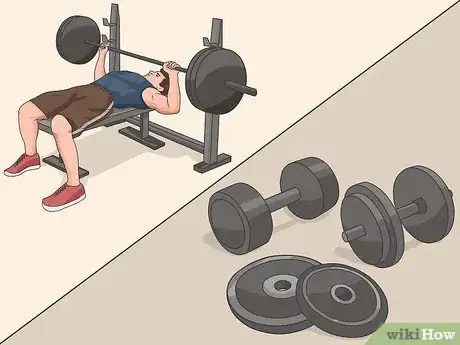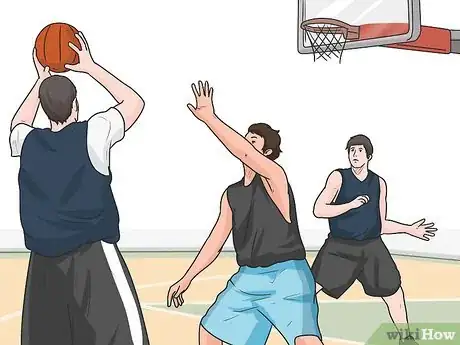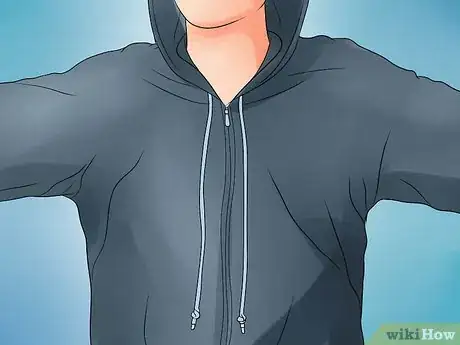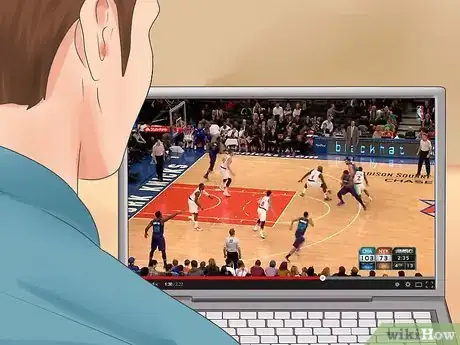This article was co-authored by Katie Dunlop. Katie Dunlop is a Certified Personal Trainer, Sports Nutritionist, and the Founder of Love Sweat Fitness. She specializes in helping others with nutrition, fitness, and lifestyle choices. Katie has also developed LSF Nutrition, a nutrition supplement line, and a mobile workout application, Love Sweat Fitness The App. With her platform and tools, she has helped over one million women and has been featured in publications such as Women’s Health, Shape, and Health.
There are 8 references cited in this article, which can be found at the bottom of the page.
This article has been viewed 128,835 times.
Jocks play sports to learn self-confidence, teamwork, and leadership. Also, they often stand out as social leaders in their schools. If you're willing to dedicate to a sport and positively develop your social life, you're already on the right track.
Steps
Excelling in Sports
-
1Determine which sport(s) you want to play. Maybe the most important step to being a jock is being an athlete. Typically jocks are associated with high school and college football, although basketball and wrestling are also common choices. Participate in pick up games at local parks, or organize friends to play together. Ask team coaches to let you work out and practice with a team. Once you know which one suits you best, try out for your school team.
- When picking a sport, ask yourself these questions: Which sport do I have the most fun playing?[1] Is my body type right for this? What are my natural physical talents? What are my friends playing?
- More sports to consider playing include cheerleading, dance, water polo, volleyball, gymnastics, swimming, diving, softball, rugby, lacrosse, tennis, and golf.
-
2Try out for your school's team. After figuring out which sport suits your talents and joys most, go to the school try-outs. Coaches post information about try-out dates and locations, typically in the gym. You can ask coaches or even other athletes for more information about what equipment or special clothing you need to bring. Make sure you come prepared.
- Talk with older students who are already on the team for specific information about what exercises or tests will be a part of try-outs.
- Most sports are seasonal (i.e. basketball is in winter and football in summer). You can possibly play for multiple teams.
- If you don't make the cut for one team, don't be discouraged. You can try out for another sport. Some teams, like Track & Field, commonly accept most applicants. Even if it's not your first choice, it's an excellent way to build yourself up as an athlete and make it more likely you're chosen next season.
Advertisement -
3Join a recreational league. If your school doesn't have the sport you're interested in, or you're not chosen but feel committed to a particular sport, this is a great option. Many cities have organized sports leagues for players of all ages and talent levels. Some are more competitive than others and require traveling greater distances for games. Talk with other jocks as well as coaches to learn more about each league's reputation.
- Go to a game just to watch and see if you like the level of competitiveness.
- See if your friends are interested in putting together a team. If you have enough people for the sport, it is common for large groups of friends and acquaintances to form their own squad.
-
4Attend all practices and scrimmages. It is often said that practice makes perfect. In order to become a better athlete/jock, you need to consistently put in effort. Learn to acknowledge and hone your strengths while understanding and improving upon your weaknesses. Work with your coach; good coaches will help you excel and find the right position for you in any sport.
- Practice is the place to try out different roles on a team to figure out which one suits you best. Each sport has a number of positions with different responsibilities and skill sets; explore your talents as an athlete.
- Scrimmages are friendly matches where team members play one another. Use these opportunities to take individual risks as well as develop your awareness of how to work as a team. Generally, scrimmages are not played full force to avoid injury.
-
5Study sports strategies. Whether it is football plays or soccer formations, any sport you play will have theories on how to best face an opponent. Take the time to train your brain as much as your body and it will pay off come game time.
- Talk with older, more experienced players on the team(s) you join.
- Read books on tactics specific to your sport.
- Learn the philosophies of athletes famous for their skill and victories.
-
6Work out. Physical strength is one of the main characteristics of jocks. Those who are taller, heavier, and more muscular are most likely to be considered top picks for sports teams.[2] If you join a sports team, you may be working out as a team on a regular basis. Spend time learning different exercises to build the various muscle groups so your whole body becomes stronger.
- Athletes need to eat anywhere from 2,500 to 3,500 calories a day.[3] Eat a balanced diet of vegetables, fruit, grains, and protein to build muscle and stay healthy.
- Get a gym membership. Part of being a jock is identifying with the sports you play and with working out in general. If you'd like to take your effort beyond what you do on a team, or if your team doesn't work out together, join a gym and work out alone.
- Lunge jumps, squat jumps, burpees, star jumps, knee drive hops, hop overs and broad jumps are some exercises you can do at home with little to no equipment!
- Resistance bands are a great way to up-level your workouts and add serious weight at home without needing to build a full home gym. Adjustable dumbbells also can help you save space while still adding significant weights to your training sessions.
-
7Play in competitive matches. Even if you are a new player, ask your coach to give you as much active time in games/matches as possible. Make a sincere effort every game and maintain awareness of your teammates so you can work together. Respect your opponents as equals and enjoy yourself. If you win, show humility in your victory, and if you lose, remain gracious in defeat.
- The more you improve through training and live games, the more likely you will be selected to play and possibly start (be chosen to play at the beginning of a game).
Being Social
-
1Be confident. Know that you are an important, strong, capable person, and show that in your interactions with others. Walk, stand and sit with correct posture. Don't talk down about yourself. Research shows that people who play on varsity sports teams for their schools show greater self-confidence, self-respect, and leadership.[4]
- Participation in group sports will help you be confident. Research shows it leads to many characteristics, including courage, honesty, integrity, perseverance, fairness, cooperation, and respect.
-
2Befriend many of your peers. Jocks are notoriously popular. This comes with confidence, kindness, and openness. Talk to a wide variety of people in your school. Often times there are different social cliques based on mutual interests and/or cultural groups. Make an effort to talk to different people so that you develop a balanced understanding of your social world. This will also show people you are approachable and nonjudgmental.
- Spend time in and out of school cultivating friendships with the people you care about most.
- It's important to build camaraderie with your teammates on and off the field. Take the time to get to know your team so that your chemistry improves.
- Keep in mind that not every person can be your best friend. It's acceptable to establish boundaries with people and have different levels of closeness. If you are kind and honest, often times people will end up respecting you for it.
-
3Go to parties and celebrations. When your peers celebrate birthdays, team victories, major school events (i.e. prom, homecoming), or are simply hosting an event to have fun and socialize, be sure to attend. Jocks are athletes first, but just as importantly they have active and engaging social lives. Be a source of cheer, spirit, and respectfulness among your friends; bring gifts if it's appropriate for the occasion and join in any fun and games.
- Although the numbers are declining in recent years, it is still common for athletes to drink alcohol, often in excess. Keep in mind it is illegal to drink under the age of 21. Also, alcohol has a negative effect on your health and performance as an athlete.[5]
-
4Date other athletes. Dating shows you have the confidence to approach people and be vulnerable. Dating fellow athletes will multiply your appearance as cool and important. The jock identity is used a majority of the time to describe men, but some women also identify as jocks.[6] For both men and women, dating another athlete will increase your social standing.
- US and UK sports culture are sometimes associated with homophobia and misogyny.[7] However, it's best not to follow all generalizations. Even though dating someone of the same sex as you might not win the same approval and affirmation of your jock identity as being in a heterosexual couple, it's important to never deny part of who you are for other people's approval.
- Professional athletes like Michael Sam are beginning to publicly come out as gay. The public association of athletes and jocks with homophobia may be decreasing.[8]
-
5Cultivate positive relationships with adults. Being a jock also means being a leader, and this is far easier to accomplish with the guidance of elders. Look for adults you admire; this could be your coach, teachers, and other members of your community at large. Talk to them one-on-one about your life, the challenges you face, and learn what you can about how to live with grace, courage, and happiness.
- Expanding your social life beyond your peers will expand your perspective and help you navigate the different worlds in which you spend your time.
- Share the advice you receive with your peers when you feel they can benefit.
-
6Join school pep rallies. Pep rallies are common in middle and high schools. Students often gather in gym bleachers separated by graduation year and cheer on each sports team as they enter the building. Once you have joined a school team, be sure to show up in uniform to represent during the pep rally. This is an opportunity to build morale, school pride, and optimism.
- Often times pep rallies are competitions to see which class can be the loudest. Come with plenty of energy and pump up your classmates.
Maintaining Jock Interests
-
1Build healthy aggression. Jocks are generally more likely to be aggressive than their peers. [9] Aggression is not an entirely negative trait, and can have much more to do with direct expression than bullying others. Develop your ability to boldly speak your mind, while also showing respect to others.
- The sports you play will teach you what healthy aggression feels and looks like.
- Generally speaking, aggression is not wrong. However, like bullying, if you direct it at the weak and/or innocent, you can expect punishment, judgment and unhappiness within yourself.
-
2Dress like a jock. Clothing made specifically for athletes is always a good choice for anyone wanting to be a jock. If you join a sports team, wearing team jerseys and apparel is a stylish choice. This will increase your appearance as an athlete.
- Hoodies, t-shirts, pullover jackets, and jerseys are stylistic norms that can fill an entire week of jock outfits. Be sure to pair them with jeans and tennis shoes. Do not tuck in your shirts; this is similar to “nerd” looks.
- Letterman jackets are the pinnacle of jock style because they show you have achieved a level of accomplishment within your chosen sport.
-
3Watch sports. When you're not playing, practicing, or studying, spend time enjoying the sports you love. Pick a team or player(s) to support, and follow them through a whole season. Gather at your home, friends' homes, or even restaurants and sports bars to watch games communally. Plan ahead of time so people have time to gather any supplies they need.
- Purchase jerseys and other paraphernalia of the team you support to show your pride.
- Organize a potluck where everyone who wants to watch a game brings one snack or dish for everyone to eat.
- Find tickets and go to a see a professional game to experience the fervor and excitement of a live match.
- Also watch sports analysis programs on networks like ESPN, FSN, and major network broadcasts of sports events to develop your understanding of the game.
-
4Join in fantasy sports leagues. Organize a group of friends/athletes/people interested in sports to create a fantasy league together. Learn to pick players based on consistent productivity and skill; develop a wider understanding of the professional leagues of whatever sport you enjoy. This will encourage your tactical understanding of the game and give you a feel of what it's like to be a coach.
- While it is illegal to bet on real games, betting on fantasy sports is legal in the US because it is a game of skill. If you are a minor, make sure to consult your parent/guardian before betting anything.
-
5Learn about college and professional players. Much of the conversation between athletes can be about specific players, their talents, weaknesses, and even their social lives as revealed in the media. Read sports websites, watch sports programs on TV, and follow the careers of your favorite athletes and teams.
- Watching/reading interviews of talented athletes may give you a clue about the character traits that help someone become a top level jock.
Community Q&A
-
QuestionMany jocks are stereotyped as bullies. Is bullying others a requirement for a jock?
 Community AnswerYou never have to treat others poorly. The best athletes are "team players" and support others rather than belittling them. Emphasize the good qualities of being a jock and discard the mean-spirited stereotypes.
Community AnswerYou never have to treat others poorly. The best athletes are "team players" and support others rather than belittling them. Emphasize the good qualities of being a jock and discard the mean-spirited stereotypes. -
QuestionCan a girl be a jock?
 Community AnswerA girl can certainly be a jock. Never let gender stereotypes get in the way of you playing a sport, or doing anything else you love.
Community AnswerA girl can certainly be a jock. Never let gender stereotypes get in the way of you playing a sport, or doing anything else you love.
References
- ↑ http://kidshealth.org/teen/homework/sports/find_sports.html
- ↑ http://smhp.psych.ucla.edu/pdfdocs/youth/jocks.pdf
- ↑ http://familydoctor.org/familydoctor/en/prevention-wellness/exercise-fitness/exercise-basics/nutrition-for-athletes.html
- ↑ https://journals.sagepub.com/doi/abs/10.1177/1548051814538099
- ↑ http://www.ncbi.nlm.nih.gov/pmc/articles/PMC3257708/
- ↑ http://smhp.psych.ucla.edu/pdfdocs/youth/jocks.pdf
- ↑ https://journals.sagepub.com/doi/abs/10.1177/1012690214549778
- ↑ http://www.ericandersonphd.com/resources/2012%20The%20Declining%20Existence%20of%20Men's%20Homophobia%20in%20British%20Sport%20%20%5BJournal%20for%20the%20Study%20of%20sports%20and%20Athletes%20in%20Education%5D.pdf
- ↑ https://www.psychologytoday.com/blog/the-modern-teen/201011/jocks-brains-populars-crowds-effects-you

-Team-Step-5.webp)
-Team-Step-14.webp)
-Team-Step-12.webp)
-Team-Step-13.webp)






-Step-9.webp)
-Step-6-Version-2.webp)

































































